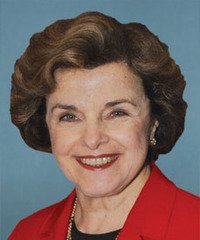
As California’s senior Senator, Dianne Feinstein has built a reputation as an independent voice, working hard to find commonsense solutions to problems facing California and the nation.
Since her election to the Senate in 1992, Senator Feinstein has built a significant record of legislative achievements across a wide range of issues.
Senator Feinstein led a bipartisan group of senators in passing legislation to drastically increase the fuel efficiency of cars. She was a leading voice in the effort to legalize gay marriage and ensure rights for LGBT Americans. She’s a champion for the preservation of the Mojave Desert, Lake Tahoe and California’s forests. She helped create the nationwide AMBER Alert network, passed bills to criminalize border drug tunnels and has long focused on improving California’s water infrastructure and reducing the threat of wildfires. She also continues to advocate for commonsense gun laws.
Senator Feinstein has long been a champion of access to affordable, quality health coverage. She strongly supports a woman’s right to make her own decisions about her health. She has also been a leader in pushing for stronger consumer protections regarding chemicals that affect our health, in areas ranging from children’s toys to personal care products.
Preventing the Spread of COVID-19
Protecting the Affordable Care Act
Expanding Health Care Coverage
Reproductive rights
Medical research
Helping at-risk women detect cancer: Senator Feinstein authored and secured passage of a bill that requires health care providers to inform patients if they have dense breast tissue, a factor that places women at a higher risk of breast cancer. Early detection is critical to increasing the chance of survival for women with breast cancer and patients deserve to know their own medical information in order to make fully informed decisions about their health.
Increasing diversity in NIH clinical trials: Senator Feinstein included language in the fiscal year 2020 spending bill to help reduce barriers to clinical trial participation for minority groups by directing the National Institutes of Health (NIH) to revise existing protocol templates and guidelines for clinical trials that receive NIH funding. Racial and ethnic minority groups have been largely underrepresented in clinical trials among adults and evidence shows that irrelevant criteria may be inappropriately excluding these groups.
Confronting the Opioid Epidemic: To address the staggering number of drug and opioid overdose deaths ravaging this country, Senator Feinstein authored a number of key provisions that were included in the comprehensive, bipartisan opioid package, known as the SUPPORT for Patients and Communities Act. This bill holds drug manufacturers and distributors accountable for failure to report suspicious orders of opioids and reauthorizes critical substance abuse prevention, treatment and enforcement programs that directly benefit California, including the Drug Free Communities, High Intensity Drug Trafficking Areas program and drug court programs.
Maintaining funding levels for safety net hospitals: Senator Feinstein worked to prevent funding cuts to hospitals that serve a high percentage of Medicaid patients, known as Medicaid Disproportionate Share Hospitals. She successfully fought for higher funding levels as part of the Patient Protection and Affordable Care Act.
Cracking down on rogue Internet pharmacies - Senator Feinstein coauthored legislation to crack down on rogue Internet pharmacies that sell controlled substances without a valid prescription, while protecting consumers who fill legitimate prescriptions online.
Banning phthalates in children’s toys - Senator Feinstein authored legislation to impose a nationwide ban on phthalates in products designed for children’s use, modeled after the California and European Union bans. Senator Feinstein’s language was included as a provision of the comprehensive Consumer Product Safety Improvement Act of 2008.
Breast Reconstruction Surgery: Senator Feinstein cosponsored the Women’s Health and Cancer Rights Act, which requires health insurance plans to pay for breast reconstruction surgery following mastectomies.